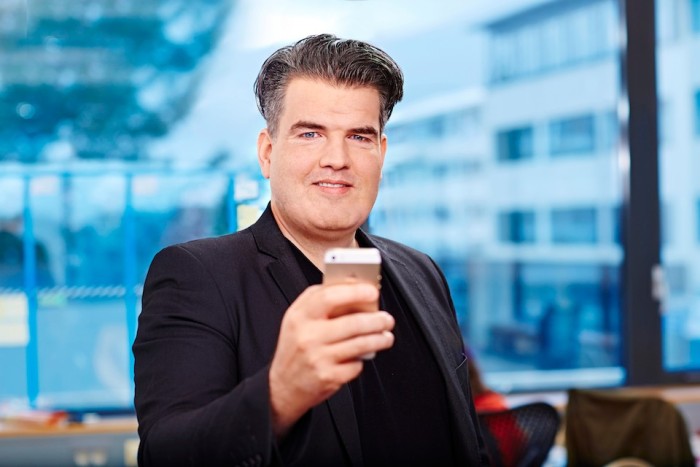Authenteq is a identity verification and reputation management platform that helps online marketplaces increase transparency and trust by issuing Authenteq IDs to their users to verify that they are who they say they are.
By Thorunn Jonsdottir
Started as Verificy in March 2014, the team soon decided to change the name to Authenteq as most people pronounced Verificy as “Very Fishy” – not a very reliably sounding name for a startup in the business of verification and reputation management.
But how did it all start? Kari Thor Runarsson, Co-founder and CEO of Authenteq says it all started with a trip to Spain a couple of years ago. He rented a car and quickly realised that there was a scratch on it. After returning the car and traveling back to Iceland he received an email from the rental agency saying that they wouldn’t be returning his security deposit because of a scratch that they said happened during his rental. He protested and after a chain of emails they finally agreed with his case and gave up.
“I found it strange that there wasn’t a way to trust a digital photo. In fact it only takes my 14 year old son a minute to take a picture with his smartphone and using photoshop on his phone, he can alter the photo almost as he wishes. With all this technology there must be a way to be able to trust photographs. I mentioned this to my father, who has 20 years of experience in IT security, and the ball started rolling,” Runarsson recounts.
And Then Came the Pivot!
Soon after Runarsson started working on Authenteq he decided to apply to Startup Reykjavik, a 10 week accelerator inspired by Techstars. Equipped with the seed money the programme invested in the participating companies, he hired a mobile programmer who had previously worked for Iceland’s largest telecom company. Runarsson explains that during their first meeting the programmer said that a tamperproof app to solve the verification problem couldn’t be built. But as a former member of the Icelandic Olympic Squad in Mathematics and the type that loves challenges, he agreed to join the team to find out if this could in fact be done. They went through the accelerator and managed to churn out a rough prototype in 10 weeks.
“After the programme ended we were released into the wild all by ourselves. We tried to get funding but the startup funding environment in Iceland is tiny that it didn’t take long to meet with all of the investors there. We received great feedback and people seemed to like what we were doing, but nobody was ready to put money into just an idea. Looking back that was a good thing because during this time we re-evaluated the whole concept. In November we emerged with a completely new business concept that involved using a quick and secure method to verify people’s real off-line identities and issuing electronic IDs that people can use online to better gain trust of strangers they meet in online marketplaces,” Runarsson recalls.
Growing a Team While Boostrapping
Competing for skilled developers in a very small and highly competitive market must be a challenge for a company that’s been boostrapped from day one. Teaming up with Reykjavik University, Authenteq has been working with three graduation students of computer science for the last 3 months on a specific set of features in the Authenteq system. Currently with a team of one full time and two part time developers in addition to his own role at the company, how does Runarsson plan to grow the team?
“Building a startup isn’t easy, especially one that relies so heavily on deep technical knowledge and experience as ours. This means that we can’t build the team on twenty-somethings fresh out of school. The people that have been a part of Authenteq are all doing this out of passion and interest and that’s exactly why we can compete with the larger companies. We only want people onboard that truly believe in the project and the problem we are solving. If we have to go into a bidding war with a large IT company over a potential team member they aren’t the right person for us. I think that the type we are looking for has mutually exclusive needs and interests to those wanting a secure paycheck and a stable 9-5 job. We can’t offer job security or family oriented work hours, but we can offer being an integral part of a growing startup that is solving a problem that is only getting more serious, in a market that is only growing larger. It’s not going to be easy, but it’ll be one hell of a rollercoaster ride,” Runarsson says.

When trying to build a great team, having good advisors is key to bridging the gap until a team is fully formed. Runarsson agrees, saying,
“My father, who has been our lead advisor from the start, gave me some invaluable feedback based on his 20 years of experience in IT security. His knowledge became even more relevant when we pivoted and he could advise us on the complex world of electronic identities. He has more experience in this field than most people as he’s been involved in rolling out national eID schemes in two countries so far. His connections allowed us to gain access to technology usually reserved for government grade border control that we are incorporating into our product.”
Knowing How to Deal With Bad News
Authenteq has evolved a lot since graduating from the Startup Reykjavik accelerator last year. This weekend they pitched to get into the Startup Bootcamp Mobile 2015, but last year the programme was awarded Best Accelerator during the European Tech Startup Awards.
“We think we could really benefit from the mentor network around that Startup Bootcamp and that it would allow us to emerge as the leading players in the identity verification management field,” Runarsson says and goes on to explain that they’ve taken the company as far as they can without outside funding. They now have a working prototype that proves that the concept is viable and they have been getting interest from various prospective partners.
“Luckily, even though the VC and angel environment is very small in Iceland there is a fairly generous public grant environment that we have been fortunate enough to have access to. We’ve received a few grants that have helped enormously. The remaining funds have come from the money I made when my last startup was sold,” Runarsson explains.
Runarsson is referring to CLARA, an Icelandic startup that exited to a Silicon Valley based and NASDAQ listed company two years ago. Runarsson was one of the company’s founding members.
“I think one of my main strengths as CEO is that I’ve been on this rollercoaster ride before. I have a more realistic view on what it will take to succeed and don’t let the hard times get to me. I’ve experienced first hand what it’s like to make a successful MVP and the importance of picking myself and the team up quickly after making a mistake or getting disappointing news,” Runarsson adds.
The Authenteq team is now ready to take on outside funding. But what do they look for in an investor?
“First and foremost we need an investor that is good to work with, has the right experience and network, and most importantly shares our vision. The chemistry needs to be there. Adding an investor to the shareholders is a huge step. If finding a co-founder is like marriage then finding an investor is like finding a mother-in-law. You might be stuck with her for the rest of the startup’s life. She can be a great addition to your life or make it a living hell,” Runarsson explains.
The Difference Between Privacy and Anonymity
When asked about the opportunities the growing peer to peer services provide for companies like Authenteq, Runarsson is quick to respond.
“Over 80% of internet users have participated in the P2P economy and there over 10,000 P2P sites on record. While this is a huge market that is expected to grow 20% yearly there is one threat to this ongoing growth; the issue of trust, or rather lack thereof. I think that in 3-5 years time we will look back with astonishment at how we conduct ourselves in online transactions and communication. Buying a computer from an anonymous person with only their account name on an online marketplace is similar to meeting that person in a dark alley to hand them money while they give you an unmarked box that you can’t open until they have disappeared into the darkness of night. There are plenty of examples of this such as vandalism during Airbnb rentals and Uber drivers committing heinous crimes because they are operating behind anonymity. We realise that people don’t always want to appear under their real names and we respect that. In fact, with Authenteq, the user himself determines what information is public and available to others. There is a very important distinction between anonymity and privacy. With Authenteq, users are no longer anonymous but they retain their privacy,” Runarsson concludes.
 Nordic Startup News Early Stage Startup News From The Nordics
Nordic Startup News Early Stage Startup News From The Nordics


